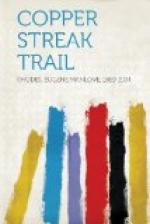“Que cosa?” He pointed behind them and to the north, to a long, low-lying streak of dust.
“Trouble, Don Hooaleece? I think so—yes.”
They had no spyglass; but it was hardly needed. The dust streak followed them, almost parallel to their course. It gained on them. They changed their gait from a walk to a trot. The dust came faster; they were pursued.
That was a weird race. There was no running, no galloping; only a steady, relentless trot that jarred poor Boland to the bone. After an hour, during which the pursuers gained steadily, Pete called a halt. They took the packs from the led animals and turned them loose, to go back to Fishhook Mountain; they refilled their canteens from the kegs and pressed on. The pursuit had gained during the brief delay; plainly to be seen now, queer little bobbing black figures against the north.
They rode on, a little faster now. But at the end of half an hour the black figures were perceptibly closer.
“They’re gaining on us,” said Boland, turning his red-lidded eyes on Stan. “They have better horses, or fresher.”
“No,” said Stan; “they’re riding faster—that’s all. They haven’t a chance; they can’t keep it up at the rate they’re doing now. They’re five miles to the north, and it isn’t far to the finish. See that huddle of little hills in the middle of the plain, ahead and a little to the south? That’s our place, and we can’t be caught before we get there. Pete is saving our horses; they’re going strong. These fellows are five miles away yet. They’ve shot their bolt, and they know it.”
He was right. The bobbing black shapes came abreast—held even—fell back—came again—hung on, and fell back at last, hopelessly distanced when the goal was still ten miles away. Pete and his troop held on at the same unswerving gait—trot, trot, trot! The ten miles became nine—eight—seven—
Sharp-eyed Benavides touched Pete’s arm and pointed. “What’s that? By gar, eet is a man, amigo; a man in some troubles!”
It was a man, a black shape that waved a hat frantically from a swell of rising ground a mile to the south. Pete swerved his course.
“You’ve got the best horse, Joe. Gallop up and see what’s wrong. I’m afraid it’s Jackson Carr.”
It was Jackson Carr. He limped to meet Benavides; the Mexican turned and swung his hat; the three urged their wearied horses to a gallop.
“Trouble?” said Pete, leaping down.
“Bobby. I tied up his pony and hobbled the rest. At daylight they wasn’t in sight. Bobby went after ’em. I waited a long time and then I hobbled off down here to see. Wagon’s five or six miles north. One of my spans come from down in Sonora, somewhere—Santa Elena, wherever that is—and I reckon they’re dragging it for home and the others have followed, unless—unless Bob’s pony has fallen, or something. He didn’t take any water. He could follow the tracks back here on this hard ground. But in the sand down there—with all this wind—” His eye turned to the shimmering white sandhills along the south, with the dust clouds high above them.




